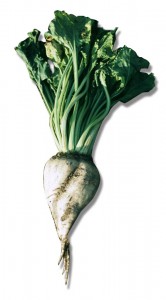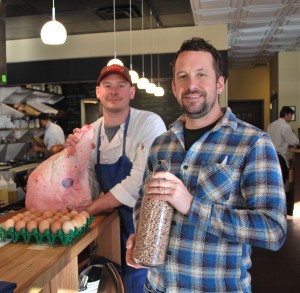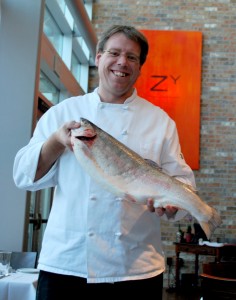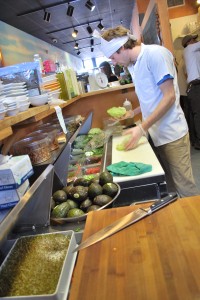
Utah and Idaho were once the largest sugar producers in the United States. As the global marketplace became increasingly efficient, Utah and Idaho Sugar (U&I) could no longer compete with imported C&H Sugar‘s much more efficient operations in Hawaii. (I had no clue of this fact, until I began doing research on why Sugar House was named such -which is an interesting story.)
As went sugar, more food items followed and became commoditized in the United States and all over the world: eggs, beef, poultry, produce and sadly even beer and chocolate. A commodity item is any ingredient or item, which has no discernible characteristics from the same item produced elsewhere. It would be hard to taste the difference between beet sugar and cane sugar, because both are granularized removing everything besides the sucrose. But this is not the case for unprocessed commodity items such as produce, meat, beer and chocolate.
Today, food that isn’t produced under a corporate-mega-factory model in the same manner as glue and IPods is now fetching a higher price than similar items produced in factory farms. More consumers are insisting on buying their food from local providers, and patronizing restaurants who go to great lengths to support local farms and quality ingredients. Essentially consumers want to know the story behind what they are eating.
Indicative of this trend is not only the closing of Walmart stores and record losses, but also the amazing popularity of the new $12.00 magazine called Lucky Peach, it’s a quarterly food journal that is all about the localvore food movement and the growing American foodie obsession with quality ingredients and the joy of preparing great food. From the 2012 Winter issue:
Any restaurant owner who decides they are going to buy their meat from the same company that supplies their bleach and mop heads, has something seriously wrong in their head. not an exact quote

This hardcore emphasis on using ingredients from local providers is causing a shake-up in Salt Lake City’s restaurant marketplace. In a few restaurants, their commitment is placing giant distributors like Sysco on the sidelines and sometimes cutting out the distributor and middle-man altogether; some chefs and restaurant owners are going so far as to build relationships directly with farmers, to raise crops and livestock specifically for their restaurant.
The Copper Onion
Ryan Louder opened the Copper Onion in downtown Salt Lake City in March 2011. The crowds flock to Copper Onion for their wonderful brunch, amazing pork chops, burgers, fish and fresh soups.
“I get my eggs and pork from Christiansen Farm [out of Vernon, Utah]. I know the man who is feeding my chickens and my pigs, and I can trust that he knows what he is doing,” says Louder. Farmer Hans Christian Christiansen graduated top of his class in agriculture science from BYU Idaho and his passion extends to the point where he visits his customers once a week in Salt Lake City. Christiansen’s web site now accepts orders directly from the public.
Copper Onion recently invested in purchasing hen houses and chicks for Christiansen to raise hens specifically for Copper Onion’s egg demands. “We go through about 220 dozen eggs per week. We felt like we wanted to have the better eggs and we decided that having our own hens was the best solution. These eggs are very deep, dark, yellow and delicious.” says Executive Chef Jamison Frank. Through careful selection, the chefs at Copper Onion found the chickens that produced the best eggs were Red Sex links and they purchased 500 chicks for Christiansen to raise exclusively for Copper Onion. Frank expects to get about 60-75 dozen eggs a week from their hens once they are full grown.
The same choosiness applies to Louder and Frank’s selection of pigs. These men know their pigs. A large oil painting of a pig adorns the Copper Onion’s front wall. The Burkshire/Duroc pig, they decided, yields the perfect desired combination of fat content and flavor, and they trust their local farmer, Hans Christiansen, will raise the quality pigs that will produce the significant difference required for their signature pork dishes.
ZY Wine and Cheese

Head Chef and owner of ZY Wine and Cheese Mathew Lake has a similar affinity for local providers. When asked about his favorite ingredients, he raves about Beehive Cheese’s latest award winning variety. “Its called Teahive, and I’m just in love with it. I think I like it even more than their Barely Buzzed cheese.” Lake adds that Utah is no longer a little league producer of fine products. Companies like Beehive Cheese and Creminelli Sausage are big suppliers, whose products are distributed all around the U.S.
Besides cheese, Chef Lake adds that another of his favorite ingredients is 13-pound Steelhead Trout, caught off the coast of Northern Oregon. He says the fillets are beautiful and the flavor is rich without being as oily as salmon.
Asked why he decided to relocate from New York to Salt Lake City to start his restaurant, Lake explains “My restaurant is jam packed with quality local food items that I first saw at he local Farmers Market. Some people thought I was crazy to open a fine dining restaurant during the recession, but I felt confident that the demand was there.” It looks like Lake was right, his first six months in business have been successful.
Omar’s Rawtopia

Omar’s Rawtopia in Sugar House has realized incredible growth and success despite their niche offerings: raw, vegan salads, sandwiches and wraps with a Middle Eastern flair.
Omar Abou-Ismail learned how to prepare raw, organic food when his father was ill, and in so doing, developed a passion for using only raw ingredients to create meals. Chef Adrian Raigne prepares the food daily while Omar develops recipes. Raigne says that his favorite ingredient currently is turmeric. “It’s just so delicious in so many different foods and it has many beneficial properties for your health.” Second, is young coconut which they buy from a supplier who can provide the freshness they need to use the coconut properly. Third on the list is Bragg’s organic, unfiltered apple cider vinegar. Raigne addes “Omar raises a lot of the ingredients in his huge backyard garden. He composes all of the scraps from the restaurant back into his garden. He grown huge tomato plants and all sorts of greens in the summer.”
The localvore food movement is having a very positive impact on local farms. As urbanites come to respect their local farmers more, they are considering the impact that suburban sprawl and poor land use is having on their farmer’s ability to produce the food they demand. For more on this read Utah Stories’ extensive series of articles on farmer’s market artisans and vendors.§





